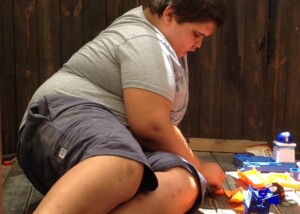Here are 5 signs in your child that point to possible autism that you’d never think could be a feature of being autistic.
Some parents vehemently deny that their child might be on the Spectrum.
Even in today’s age of generous publicity about how autism presents as a spectrum and how it can manifest so differently from one child to the next, there are parents who could not possibly fathom the idea that their “quirky,” “odd” or “intense” child could actually be autistic.
Another reason many parents won’t let their minds go near this possibility is because, in their mind, Autism Spectrum Disorder is a form of mental illness.
Certainly, the word “disorder” in the name of this neurotype doesn’t help in snuffing out the myths surrounding ASD.
Five Things Your Child Does that Strongly Hint at Autism
This list is not in any particular order.
I myself was diagnosed with ASD late in middle age.
Since then I’ve developed a hyperfixation on autism.
This means that I’ve learned so very much about this different way of thinking and seeing the world and processing information.
#1 “He has the mind of a scientist.”

Freepik/tonodiaz
Do you have a little scientist in the house? Perhaps they spend more time than you’d like on their chemistry set or studying different kinds of rocks?
Does he – or she – shine dimly in the friendship and socializing department?
Have you found yourself coming to terms with this by attributing it to their “scientific mind”?
Have you reflected, “A budding scientist isn’t going to have a lot of friends, because that’s just how the mind of a science buff works”?
Your miniature chemistry professor or paleontologist — who never gets invited to birthday parties or other events by classmates – and who’d rather talk about fossils or stalagmites with their classmates than about whatever kids normally chat up about – may very well be autistic.
Though most scientists are neurotypical, the tipoff that your child’s scientific mind shares space with an autistic mind is a deficit in social skills, and especially if they have sensory issues.
Another tipoff is that they seek conversation about their scientific topics of interest with adults, often to the point of talking excessively about them.
#2 “He’s just sensitive and particular.”

Freepik
Does your elementary or adolescent child have an aversion to trite things that other kids don’t notice?
Like for example, when I was elementary school age, I had a strong-enough aversion to drinking out of plastic glasses that the whole family knew about this.
No, I never had meltdowns or cried, but my resistance to drinking even water out of “those plastic glasses” was quite obvious.
I also had an aversion to using standard-size spoons for cereal, pudding or other spoon foods.
I had to have a “big spoon,” as I called them – a soup spoon.
At least one of my five siblings couldn’t figure this out.
He was six and a half years older and yet, never questioned why it was acceptable to eat soup with a big spoon, but felt that using a soup spoon for cereal was ridicule-worthy.
My elementary school age mind was way ahead of his. Yes, think about that: Why are big spoons encouraged for soup but not other spoon foods?
I’d make a big stink about having to use a big spoon and flat-out avoided regular spoons.
So is there anything like this in your child, some weird kind of aversion to a common and trivial object?
- Perhaps they can’t stand certain fabrics?
- Maybe certain common smells are repugnant such as that of detergent?
- Will they avoid certain food textures at all costs?
- Do they find certain sounds unbearable such as that of a toilet flushing?
- How are they with clothing tags?
- My most intense aversion is that of stickers, such as those on fruit.
#3 “She’s just into being really neat and fastidious.”

What may seem like an exceptionally orderly mind or meticulous way of thinking could actually be autism.
Yes, lots of kids are naturally tidy. But if the preciseness seems beyond what would be “normal,” and especially if your child becomes unsettled if they’re not able to, for instance, make the rug perfectly parallel to the baseboard or have the soap set smack in the center of the dish, then maybe…hmmm, just maybe….they’re a Spekkie!
- Do they line up their toys?
- If not, don’t assume that they don’t fixate on the concept of lining up.
I myself never lined up my toys, but it’s possible that throughout childhood, the need for precision was exhibited – but I just don’t recall any instances – during childhood, that is.
But I’ll bet they were there, because doggone, they sure exist in adulthood!
I can’t stand the sight of un-lined-up loose carrots in a plastic bag. They need to all be in one direction.
I can’t stand the visual of Q-tips every which way in a box. They need to be fairly parallel.
These examples are forms of “things must be orderly” or “things must be lined up.”
So in your child, have you seen derivatives of this, such as the distance between the hangers for their clothes must be the same?
If there’s excessive or narrower than usual space between their hangers, will they react?
What about shoes being lined up, and one day, a pair is accidentally knocked out of place by the vacuum or dog? How does your kid respond?
Don’t let a quiet, unremarkable response fool you. If they urgently restore order, then…maybe…just maybe…
This fixation on precision or things existing properly in a space can apply just about anywhere.
In my case, doggone, the stapler has to be a certain way in its box with other office supplies.
One day I tried to ignore the fact that it was not in there right.
Needless to say, it wasn’t long before I had to return to the box and “fix it” by setting it right.
Again, no meltdown, no hissy fit, BUT – there was that sense of urgency and being unable to let it go.
#4 “He’s just very independently minded.”

Freepik
Have you said things like this when your child doesn’t show interest in typical play with classmates or neighborhood kids and instead prefers solitary play?
While “all the kids” at the park are playing tag or kicking a ball around, your child is climbing on the playground or flying a kite – solitary activities.
“As long as he’s getting plenty of exercise, I’m okay with it,” you might think.
Or, you might’ve spotted him or her playing alongside other kids with a little bit of interaction, but it’s more like parallel play rather than direct involvement.
“Well, at least she’s out there among the other kids,” you might say.
But preference for solitary or even parallel play could very well point to ASD.
#5 “It’s okay if she fidgets a lot. I read it burns calories and I don’t want a fat kid.”

©Lorra Garrick
Actually, this is true: Fidgeting daily can burn enough calories to shed 10 pounds in one year; research supports this.
But that calorie-burning fidgeting could also be stimming: self stimulatory or repetitive behavior, which is extremely common in autism as a frequent go-to for emotional regulation, while for neurotypicals it’s done usually during periods of significant anxiety such as waiting for the judge to call up your case in court.
Autism is even more likely if the so-called fidgeting is peculiar, strange or otherwise offbeat.
- Chewing on drinking straws
- Chewing on a necklace
- Chewing on collars or sleeves to the point that they’re damaged
- Skin picking
- Frequent “mindless” humming
- Spinning or jumping outside the context of dance or exercise
- A lot of time watching things that spin
- Excessive sniffing of a particular odor
- A lot of rocking, tapping, foot or hand flapping
Why Parents Might Deny These Signs of Potential Autism:
- Fear of stigma or labeling
- Lack of awareness of autism traits
- Misunderstanding normal variation in child development
- Belief that the child will “grow out of it”
- Distrustful of the field of psychology
- “I was like that when I was his age.”
This list of five signs in a child that a parent may overlook as suggestive for autism is far from complete, but it’s a good start.
- If you recognize your son or daughter in much of this narrative, you’ll want to consider that they just might be on the Autism Spectrum.
- However, an assessment with a psychologist or neuropsychologist will provide a more definitive conclusion.
Can Autism Be Ruled Out if the Patient Has Good Eye Contact?





































